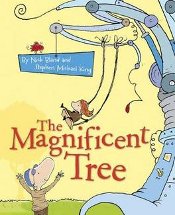The magnificent tree by Nick Bland and Stephen Michael King

Scholastic, 2012. ISBN 9781 74283 295 1.
(Ages 5+) Recommended. Picture book. Simplicity.
Pop and Bonny are always making things for each other. Designing and
inventing is the way Pop works out things, while Bonny prefers a
more hands on, earthy way to work. Consequently, Bonny makes a
recycled paper card for her Pop, whereas Pop, wanting to fly, spends
many hours planning, designing and then making a contraption to help
him achieve that aim, with disastrous consequences.
When both notice that the birds have nowhere to perch, Bonny
suggests they need a tree and the two go about their quest for a
tree in stunningly different ways. Pop again plans and designs and
eventually builds a mechanical tree, while Bonny simply plants a
seed. Pop's finished product looks like a tree, but its mechanical
branches and discordant and pointy leaves, do not allow the birds a
quiet restful place to perch. Bonny's tree on the other hand is just
what the birds need and so they take to it without hesitation, while
Bonny finds a use for Pop's tree.
There are a number of picture books at the moment about invention
and using imagination. Frank n Stan (Robertson) and The
terrible suitcase (Emma Allen) for example intrigue the
reading audience with inventions such as the mechanical man (Frank)
in the first and the rocket ship in the latter. The magnificent
tree, is another showing imagination being used for the same
end but in entirely different ways. Pop's mechanical tree, despite
all his work, invention and design, simply does not fit the bill,
whereas Bonny's simple idea of planting a tree suits the purpose.
Reiterating this lovely story the illustrations make clear the
conservation message, reinforcing the idea that simple is best, and
strengthening the dialogue between the generations. Readers will
love Pop's stubbly chin and various hats, while watching out for
Bonny's exuberant face, and I can imagine many will clamour to make
the mechanical tree or at least a like version, at the end of the
story.
Fran Knight